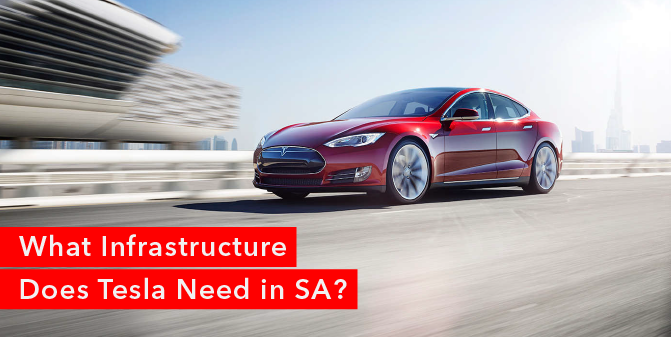What Infrastructure Does Tesla Need in SA?
Many motorists dream of driving a car that doesn’t require petrol. But the reality is that in South Africa, we’re far from having widespread access to renewable energy vehicles.
It’s somewhat ironic, then, that the driving force behind one of today’s most iconic electric cars is South African-born Elon Musk.
So what would it take for our country to support the large-scale adoption of the Tesla? Here’s a look at some of the infrastructure required.
Electric vehicle infrastructure in SA: What are the roadblocks?
Most critically, to sustain a significant number of electric cars, South Africa would need an electric vehicle (EV) network of public charging stations. These are designated areas where drivers are able to recharge their cars whenever required, and they’re particularly critical along roads used for long-distance travel.
To put it in perspective, you could drive your new Tesla Model 3 – due for release in South Africa late next year – for about four hours before needing to recharge it. Without sufficient EV charging stations, you could find yourself stranded with a dead battery.
Another important piece of infrastructure is a reliable electricity grid. A stable supply of energy – one uninterrupted by load-shedding and periods of black-outs – is necessary to support a substantial number of electric cars.
The current state of SA’s electric vehicle charging network
That said, South Africa is slowly establishing an EV network, fuelled primarily by the country’s larger vehicle manufacturers. In 2015, BMW and Nissan South Africa joined forces to plan and build a national grid of charging stations for EV and plug-in hybrid vehicles (PHEV). These stations will primarily serve BMW and Nissan drivers.
However, the national grid will also be equipped with smaller alternating current (AC) type car chargers in certain SA regions. These will enable all EVs and PHEVs to connect and recharge via the grid.
If you’re ready to embrace EV technology – and you’re not concerned about the potential logistical hiccups – your dream could be closer than you think. For about half a million rand, or just a touch more, you could be the proud owner of a Tesla Model 3 in 2017.




